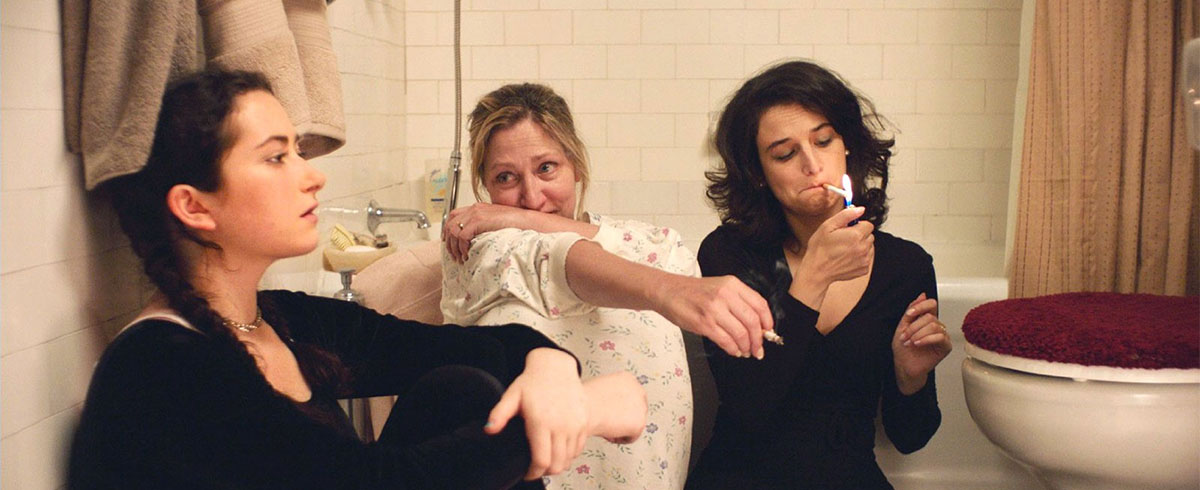 |
| Abby Quinn, Edie Falco and Jenny Slate in Landline |
Nostalgia is not what it used to be. Landline, a fairly genial, diffident comedy about diffident, fairly generic people, plants its flag in 1995 and surveys a landscape of indie rock, "Must See TV" and the high-waisted bluejeans that have recently started coming back into fashion. Hillary Clinton is on television, sporting a hairband and a pink suit.
Mostly, though, as the movie’s title whimsically suggests, the mid-90s were an era of adorably quaint technology. Characters make calls from pay phones and listen to messages on answering machines. They take pictures with boxy little cameras, rent videocassettes of movies and make mix tapes on actual cassette tape. The members of an upper-middle-class New York household share a single desktop computer, with a dot-matrix printer and a slot for floppy disks.
One of those antique data-storage devices provides the pretext for a bit of plot. Ali (Abby Quinn), the younger of the two Jacobs daughters, discovers a trove of erotic poetry her father has been writing to someone other than his wife. These proto-sexts are part of a small epidemic of infidelity among the Jacobses. Ali’s older sister, Dana (Jenny Slate), recently engaged to her live-in boyfriend, Ben (Jay Duplass), sparks up some action on the side with Nate (Finn Wittrock), a guy she knew in college. "We’re a family of cheaters," Ali says in disgust.
Landline was directed by Gillian Robespierre, who wrote it with Elisabeth Holm. They also collaborated on Obvious Child, which starred Slate, and which was notable for the mixture of sweetness and candor it brought to the subject of abortion. There was something bracing, as well as brave, about that film’s honesty. Oddly, the new one is much more cautious and decorous in its treatment of the emotional dynamics of a complicated family. For all the profanity and naughty behavior, it has the timid, ingratiating vibe of a television sitcom, sticking to safe and familiar emotional territory.
Or, more to the point, it might remind oldish viewers of a certain kind of observant, clever but unambitious independent film that came to prominence in the era it depicts. The characters are not badly drawn, but they stay within the lines. Dana is the flakier sister, and also the more responsible one. Ali is quiet, guarded and critical. She is both more reckless and more grounded than her parents suspect.
The parents, meanwhile, are near-caricatures of middle-aged compromise. Alan (John Turturro) clings to his literary ambitions and works at an advertising agency. His wife, Pat (Edie Falco), works in environmental policy but doesn’t talk much about it. They refer to a wilder life back in the ’70s, but, like much else in the movie, that feels more like a talking point than like an aspect of authentic experience.
Turturro and Falco, with their lived-in faces and deeply seasoned acting technique, provide Alan and Pat with more individuality than the script does. The filmmakers seem hesitant to make any of their characters too interesting. Each one is an assemblage of surface quirks and emotional responses, neatly inserted into a series of dramatic and comic situations. Some of these pay off nicely, in particular when Slate and Quinn share the screen and capture the jumpy, push-and-pull rhythms of loving but not entirely compatible sisters.
It’s strange to think that if Ali and Dana were real, they would now be in their early and later 40s. The fact that they seem so much like present-day young people is less an anachronism than an aspect of the film’s hopeful, soothing attitude. It’s a peace offering from Generation X to the millennials, a gesture of solidarity from one cohort of the metropolitan upper-middle class to another. We’re just like you, and we’ll all grow up eventually.



No comments:
Post a Comment